Personal Safety
Guidelines To Extreme Hiking: A Must-Read For All Hikers
Extreme hiking is fun, but it’s very dangerous. That’s why it takes months of preparation before anyone can traverse the wilderness or scale the side of a mountain. So read through this list of safety guidelines first before you go out into the woods.
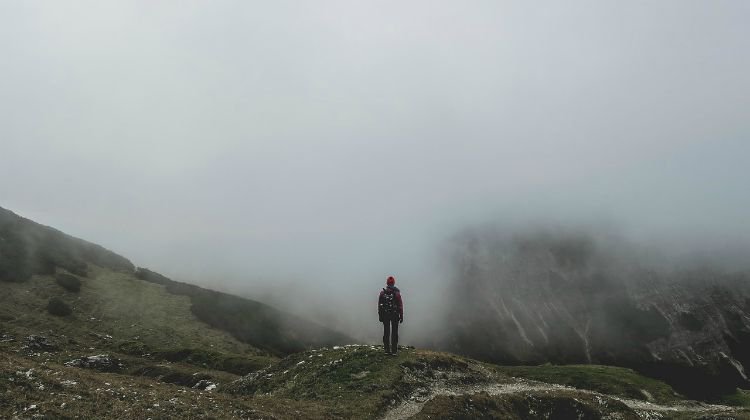
When you’re out hiking in the woods or high up in the mountains, there’s nothing that will guarantee your safety. From rough terrains to unpredictable weather to wild animals, extreme hiking is as dangerous as it is fulfilling. Remember the film 127 hours where James Franco had to cut his own arm off? That was but a glimpse of what can go wrong when you’re outdoors and you’ve ignored probably one or two of these important safety guidelines.
The Survival Guide to Extreme Hiking
This post is courtesy of OutdoorWarrior.com and shared with permission.
Extreme hiking is fun, but it can be very dangerous. Hikers who are unprepared for the challenge of traversing the rough and rocky terrain or navigating the length of a forest may find themselves lost or get into serious accidents. While hiking is a pastime enjoyed by many, there are a few brave souls who would take it to the next level by going to great heights and or faraway places – literally. With that said, if you’re going to do some extreme hiking, allow me to shed some light on some serious safety guidelines.
1. Extreme Hiking is NOT a Disappearing Act
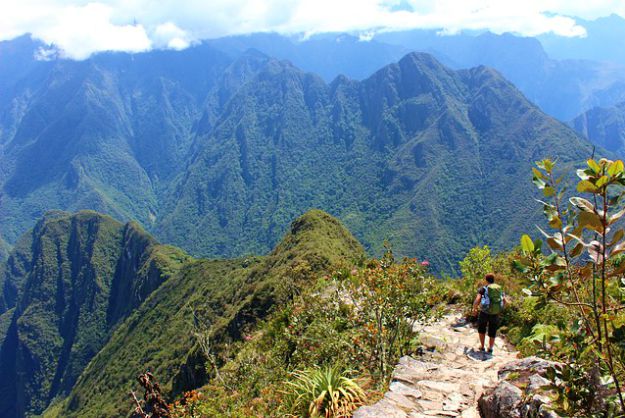
A fairly common mistake among hikers, even the experienced ones, is what I like to call the disappearing act. When they go out for a solitary trek to the range or to the mountains, they would disappear, not telling anyone where they would be prior to the hike. Again, if you’re familiar with the movie 127 Hours, you might remember Aron Ralston, who got trapped for 127 hours in one of his hikes, losing his forearm in the duration of the time. Don’t be Houdini and remember to tell your friends and family where you’d be when you go hiking.
2. Mention to Someone When You’ll Be Back
While you’re at it, tell your friends or family as well the time you expect to be back from your trip. As inhibited and not spontaneous as that sounds, if worse comes to worst, you might just be thankful to know someone will start to worry and look for you once this particular time you’ve set has passed.
3. Postpone When Necessary
Do you watch the local weather forecast before your hikes? If a storm is brewing, or the weather conditions simply would not be agreeable to your trip, postpone your hike. Many hikers have gotten hurt or have lost their lives simply because they arrogantly went on with their hiking, even with the bad weather conditions.
4. Bring the Essentials
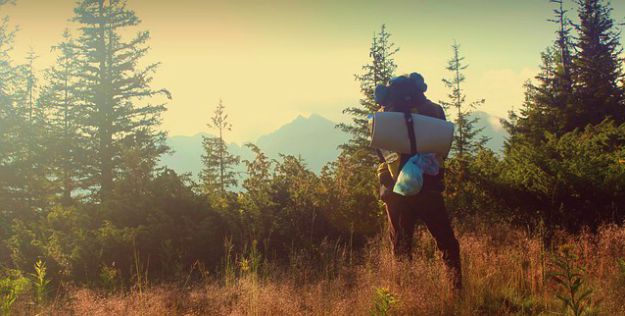
Notwithstanding food and water, as a rule, I bring with me four essential things whenever I go extreme hiking: a lighter, a map, a compass, and a pocket knife. These four things might seem like things common-sensical to bring in your hikes but some hikers have already gotten lost simply because they didn’t know where they had been going anymore.
5. Know How To Use What You’ve Brought
Of course, if you’re bringing the essential things I just mentioned, you should also know how to use them. The map, most especially. What is a map to a hiker who does not know how to track his progress with it? Learn how to use maps and make sure you’re not walking around with things you don’t know how to use.
6. Pack Light
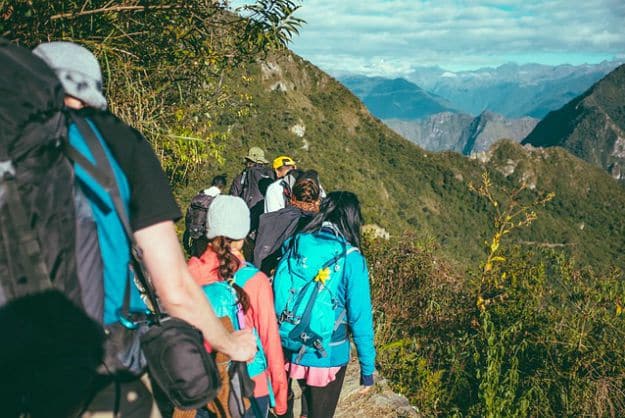
Packing light will save you from the hassle of carrying too much load, obviously, but it would also allow you travel with over-encumbering yourself. This is especially important in extreme hiking, since hikers who are slow to move and ultimately reach the night increase the danger of the sport.
7. Start Early, Like Really Early
Like around 4AM early. Yes, hiking is meant to be a daytime activity, but we want to get to the summit by around before lunchtime. Starting your hike early means that you have ample time to climb up and descend down the range, before the sun dips down again and you have to trek with a cold and dark night.
8. Get Familiar With Where You’re Hiking
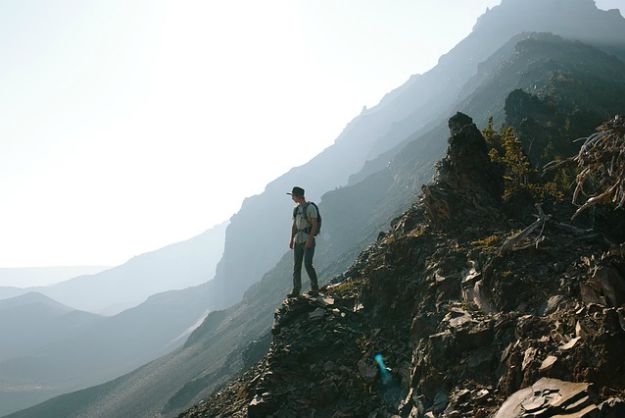
Professional hikers may seem very spontaneous when they’re out in the wilds, but that is because they’ve done their research beforehand. Get familiar with where you’re hiking by asking the locals for things to avoid or researching even the internet or library for the location’s geography. Those who prepare are more likely to have a smooth extreme hiking experience than those who decide to just wing it.
9. Learn How to Read Trail Signs
Normally there’d be trail signs on well-established hiking locations. If you see ones on the road you’re hiking, learn how to read them. Hiking routes you’re probably taking, even as an extreme hiker, will probably be full of places you need to be warned about. Hikers who don’t keep a look out for trail signs may trespass on private property or even fall in hidden ditches.
10. Be Familiar With The Predators
We’re talking about the Wilds here so you may encounter some predators along the way. Before your trip, be familiar with the predators you might be seeing along the road and bring what can be used to deter them from harming you. Bears, for example, may be genial at first, but sometimes they might see you as food. In that case bring a bear repellent spray to prevent yourself from becoming his day’s lunch.
11. Bring Copious Amounts of Water
This is very critical. Water is important for us humans, not only in the wilds but in everyday life. Dehydration is something you don’t want to occur to you, especially when you’re extreme hiking. To that end, bring copious amounts of water to keep yourself hydrated and always ready to go.
12. Sanitize Water From the Wilds
In the event that you run out of water, purify or sanitize water coming from any source in the wilds. You will need to make a heat source to boil water to remove any possible pathogens that could be lurking in the water or you could bring beforehand water purification tablets (WPT) that can easily purify the water for you.
13. Know the Different Types of Edible Plants
If you’re planning on partaking of any plants that are possibly edible, know what they are first. Not all plants are edible in the sense that they can be poisonous or detrimental to your health or the progress of your trip. Hikers have made this mistake time and again, for example with hikers who may think a particular mushroom is a Caesar’s mushroom when in fact it is the poisonous death cap.
Read the full article right here from OutdoorWarrior.com.
If you’re in search of a good video regarding the dangers of hiking (or just plain going outside), then you might enjoy this documentary by NeverNotKicking!
Do you have any personal experiences with the dangers of hiking yourself? Maybe we missed something? The wilds is a dangerous place and extreme hiking is chock full of things to discover and avoid. When you’re out in the wilderness, survival and safety should be your number one concern.
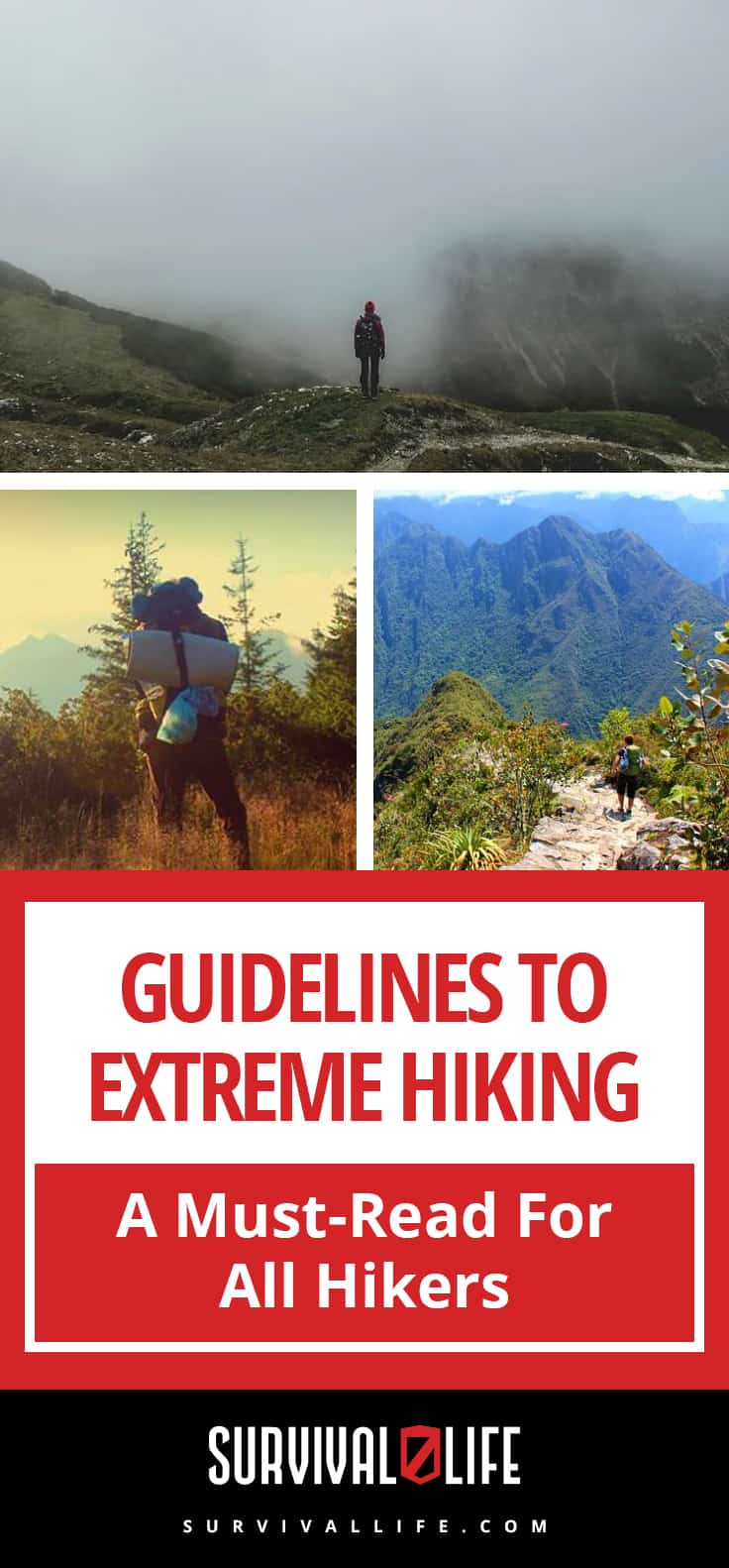
Want to read the full list of guidelines for extreme hiking? Read the whole article from OutdoorWarrior.com.
Click here to know more about important outdoor survival skills.
-

 Do It Yourself7 months ago
Do It Yourself7 months agoParacord Projects | 36 Cool Paracord Ideas For Your Paracord Survival Projects
-

 Do It Yourself9 months ago
Do It Yourself9 months agoHow To Make Paracord Survival Bracelets | DIY Survival Prepping
-

 Do It Yourself9 months ago
Do It Yourself9 months ago21 Home Remedies For Toothache Pain Relief
-

 Do It Yourself10 months ago
Do It Yourself10 months agoSurvival DIY: How To Melt Aluminum Cans For Casting
-

 Exports8 months ago
Exports8 months agoAre Switchblades Legal? Knife Laws By State


Pingback: Best Hiking Gear | Survival Life
Pingback: How Much Does It Cost To Climb Everest | Survival Life
Pingback: Amazing Hiking Trails You Have To See To Believe | Survival Life
Pingback: Amazing Hiking Trails You Have To See To Believe | Primitive technology
Pingback: Amazing Hiking Trails You Have To See To Believe – Ultimate Survival Alerts
Pingback: 22 Amazing Hiking Trails You Have To See To Believe - Survival Patch
bob
June 21, 2019 at 12:58 PM
The flint tools title is a bait and switch